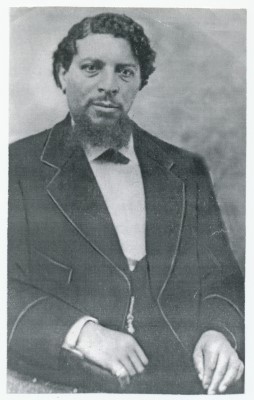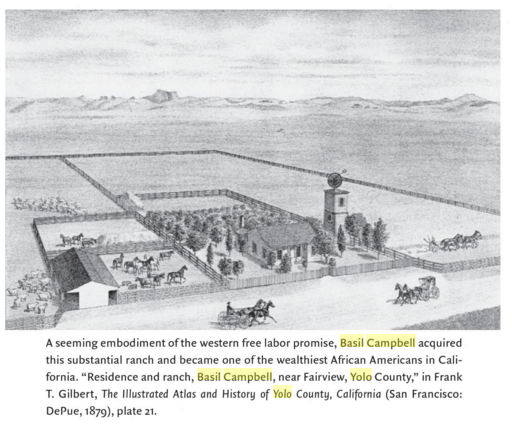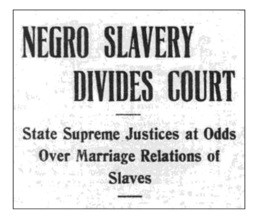 By Jerika L.H.
By Jerika L.H.
Basil Campbell – remember the name. Considered an anomaly in his days, he was the first African American to ever step foot in Yolo County. His story speaks to the power of underestimated resistance amidst the backdrop of barbaric inhumanity.
Born into slavery in 1823, he lived in Missouri until the age of 13 where he was ripped from his family and sold as property for $700 to Joseph Stephens. Upon the death of his purchaser, he was again put up on auction block and commissioned out by the Stephens family for the rental price of $1/lb for one year of slave labor. He married an enslaved housemaid named Mary Stephens who bore him two sons. Since the bonds of family were rarely recognized by white slave owners, it was of little consequence to them to sell Basil as chattel to a high bidding banker who had a tract of land in Woodland. Basil’s sons were merely toddlers at the time. He would never see them again.
In 1854, Basil was shipped to his new slave owner, J.D. Stephens, who had settled near Cache Creek. Basil had no family, no kin, no brothers or sisters in bondage, and not a penny to his name. He arrived in Woodland in chains, completely alone in every sense of the word – bound to a life of forced hard labor. Although the California Constitution of 1850 banned slavery as a stipulation of the Union, human trafficking still remained common practice as most slave owners did not keep their “property” abreast of new laws and policies. It was also against the law for most slaves to learn to read or write, as a tactic to further subjugate them. Basil was, however, an exceptionally intelligent man, and arrived at an indentured servitude contract with his oppressor in which he agreed to work for 10 years in Woodland for $100 per year. By the end of the contract, he would purchase his freedom.
Although the contract was drafted under the supposition that Basil would save his decades’ worth of yearly “earnings” in order to pay for his freedom, Basil cleverly used his initial $100 yield to invest in real estate stock. After seven years, his share had yielded $10,000. He surrendered over $700 to slave owner J.D. Stephens three years short of his ten-year freedom contract and walked off the Woodland estate a free man – two years before the Emancipation Proclamation.
Still the first African American in Yolo County, and with freedom and assets to boot, he continued to grow his fortune in property. He acquired 2,960 acres of land and approximately $7,500 in livestock by 1879. He expanded his land ownership and came to own sizable tracts in Cottonwood, CA and Fairview, CA which he rented to white homesteaders. Considered a rare example in those days, word of Campbell’s fortune spread quickly.
He married Rebecca Dolton in Sacramento and had one adopted daughter. He was elected delegate of the State Colored Convention in his later years, and even attended the National Colored Convention in Washington. Mr. Basil Campbell died with a net worth of $100,000 in assets. His life story became a legend among his contemporaries, and convinced many people of color to move westward to California out of hope to follow in his footsteps.

Several years after his death, his sons came to know of his wealth and moved westward to reclaim their father’s financial legacy. In 1910, they brought suit against Basil’s second wife Rebecca in pursuit of a share of his wealth. The court ruled that slave marriages and kinship had no legal standing and threw out the case. The overseeing judged noted, “A marriage between slaves, which neither party can create…which can be terminated [at the will of] their master, is not a marriage relation, and it is a mockery to speak of it as such.” Several appeals were consequently filed, but ultimately dismissed by the Supreme Court under the same grounds. Basil’s paternity went unrecognized and neither of his sons were allowed to partake in his remaining wealth.
 While Basil’s story is a gut wrenching testament to the triumph of human will amidst immensurable cruelty, I found it interesting how the historical documents that source Basil Campbell focused a disproportionate amount of energy on celebrating his “masters” for being honest businessmen. As quoted in the Memorial and Biographical History of Northern California, which was published in 1891 “[Basil] informed us that he considered himself fortunate in his masters in those days of servitude; that he was always kindly treated; and that in J. D. Stephens he found a friend rather than a master, who gave him a chance in the world that few of his race had been favored with. In conclusion, we would like to ask you, reader, how many white men of your acquaintance, think you, could be mentioned that would have fulfilled the contract of working ten years for freedom, when the law gave it without a cent as soon as the soil of California was reached, as did this man who had been born a slave.”
While Basil’s story is a gut wrenching testament to the triumph of human will amidst immensurable cruelty, I found it interesting how the historical documents that source Basil Campbell focused a disproportionate amount of energy on celebrating his “masters” for being honest businessmen. As quoted in the Memorial and Biographical History of Northern California, which was published in 1891 “[Basil] informed us that he considered himself fortunate in his masters in those days of servitude; that he was always kindly treated; and that in J. D. Stephens he found a friend rather than a master, who gave him a chance in the world that few of his race had been favored with. In conclusion, we would like to ask you, reader, how many white men of your acquaintance, think you, could be mentioned that would have fulfilled the contract of working ten years for freedom, when the law gave it without a cent as soon as the soil of California was reached, as did this man who had been born a slave.”
*Image provided by Yolo County Archives and Stacey Smith’s “California and the Struggle over Unfree Labor, Emancipation, and Reconstruction” (2013)





This is a fascinating read, I had no idea there were effectively slaves in Yolo County. Perhaps this idea does give root to the basis for longterm racism in Yolo. I know that there was a long time Klan group here as well. Perhaps Jerika can research that more fully too.
“I know that there was a long time Klan group here as well.”
Have they disbanded? I rather doubt it. I was “approached” by a white militia type just a couple of years ago, in West Sacramento. I heard some catch phrases that were classic Klan speech.
West Sac shaming?
Yolo shaming?
Jerika
Another great piece.
If you have the time and the inclination, I would like to see a follow up story on the adverse effects of slavery on the descendants of these marriages which occurred between slaves. One aspect of your current article that struck me was the ongoing harm done to Mr. Campbell’s two sons. They suffered the forced removal of their father thus robbing them of the opportunity for a safe, loving family. Then they were again harmed by the technically correct, but ironically punitive nature of the interpretation that marriages which occurred as part of establishment of “breeding pairs” by the slave owners could not be considered legally the equivalent of those between partners freely choosing to enter into marriage. I doubt that any documentation exists regarding the nature of Mr. Campbell’s first marriage and whether it was engaged in freely by the couple, or ordained by their owners.
I see this as an historic example of adherence to a particular interpretation of the law being placed above the interests of the children. We continue to see the reverberations of the principle of “ownership” of children over the best interests of the child in our Family Court system today.
Very interesting.
This made me consider that I am not aware of any black farmers in this area.
As of 2007 on 1.3% of farmers in the US were black. That was up .1% from 2002.
Seems like the modern business of farming has some racist tendencies given the under-representation of blacks as a percentage of the population.
Well, some of the facts are accurate, but others are fiction with an overlay of passionate drama…I have been researching Basil Campbell for years, as well as the history of Blacks in Yolo County, and am writing a book about Basil Campbell, so am pretty well-versed in the details…his life is fascinating enough without the added drama and fiction. For instance, his new wife at the time of his death was executor of his will, which I have read, and he chose not to leave anything to the 2 men who were, indeed, most likely born to him and Mary Jane Stephens in MO…they later took the name of Wheeler and lived in Texas and lost their attempt to prove paternity–the trial and probate records are all available at Yolo County Archives. There are enough mysteries to solve about Basil without the fiction. CA was a free State, but in 1854 the Fugative Slave Law meant Basil had to be given his freedom, so he was in a not uncommon agreement among the several slaves brought to Yolo County in the 1850s–he was not the first, but one of several, most if whom had agreed to work off their “slave price”–as did his half brother Elijah Jennings, who also came with his “owner” and entered, essentially, into “indentured servitude” for a prescribed period of time. In interviews, neither felt overt racism and were both accepted as peers for the most part…at least as far as all the facts seem to show.
I like this story. I recalled reading about Basil Campbell in the Sac Bee several years ago (2008) and found the article Guinda celebrates heritage.
I would not have given this particular title to this article. To me “rooted” means to establish deeply and firmly. Slavery did NOT take root in Woodland. The seed, though here, did not germinate. What rooted was economic freedom and a new relationship between the races–at least for a time.
What struck me in this article — is the pattern of how laws and government have enforced rules on black family relationships from the beginning. I find it fascinating that Mr. Campbell’s sons turned to the court system and the case was dismissed by denying their standing. Wow. I also wonder,what stopped Rebecca Dolton Campbell from providing something to Basil Campbell’s sons? Why does the government get to say, who isn’t or is in our family?
I wondered if the author knew the History of Guinda, so I am delighted to hear someone wrote about this, as I worked with a lady who was part of the “hill” people around Guinda, and even owned some land up there.
Lots of people claim to be part of rich families, including people who never contributed to the success.
Who knows if she did, since Mr Campbell was said in the article to have bought his wife’s freedom? This article does not say.
Even back then, there were laws, why don’t you ask if Gays had a right to marry, or women to vote “back then”?
To me, the narrative given shows no reason why the widow could not CHOOSE to share some or all of the estate (might not have even gone to Court)… the only thing the narrative shows us is that the Courts did not COMPEL her to share some or all of the estate.
MrsW
Your post made me think a little further. I wonder if the reason that this came before the court was opposition on the part of Rebecca, her daughter, or other members of the family. It also made me wonder about Rebecca’s ethnic background and her personal history which might have framed her decision making with regard to the estate.
Let’s see… not exactly ‘rich’, with herself, and the daughter she and her husband had adopted, to be supported, vs. two young men who were not “blood”, who might have claimed one-half to 2/3rds of the ‘inheritance’. Looks like a ‘no brainer’ to me, from Rebecca’s perspective, regardless of her ethnicity or personal history… think she’d have been more concerned about her personal future (and that of her daughter), everything considered… after all, the documentation of the boys’ parentage was not probably ‘provable’, neither with paper trail, birth records, and definitely not DNA.
And, the ‘hero’ of the narrative, had he intended for his ‘lost sons’ to be beneficiaries, would he not have left directions as to what he wanted done with his ‘estate’ if they were ever found/came forward?
I think the Court made the right decision, for terribly wrong/unjust reasons…
In your opinion…
The article claims there were grandchildren involved too.
That’s exactly what I said… what part of “I think” do you not understand? Or, should I have worded it, “in my opinion”.
What is your opinion? Should the wife gotten 100%, until her death, then the remainder (if any) split 3 ways (maybe only two, to the boys — don’t know what CA law provided for in 1910 – might have only provided for ‘natural-born children’)? Should the boys gotten all of it as “blood” [leaving the widow and adopted child nothing]? What is your opinion?
One could easily argue, morally, that with the widow not willing to share, she forfeited all rights…
Didn’t see your second sentence to your 3:53 post when I responded to you… FWIW…
Also, just re-read the article/narrative (twice), and still see no reference to grandchildren, particularly in 1910. Can you help me (and, perhaps others) with a paragraph # ? Thx…
Fascinating article.
I have been fascinated by the history of black farm workers in Yolo County since I looked at an early 1900’s map of Capay Valley 35 years ago in Shield’s Library and what is now called the Guinda Hills was named — on an official USGS map — “N****r Heaven”. I kid you not.
I also have fond memories of eating at Slaughter’s BBQ Pit in Guinda in the early 1980’s, owned and run by a local black family.